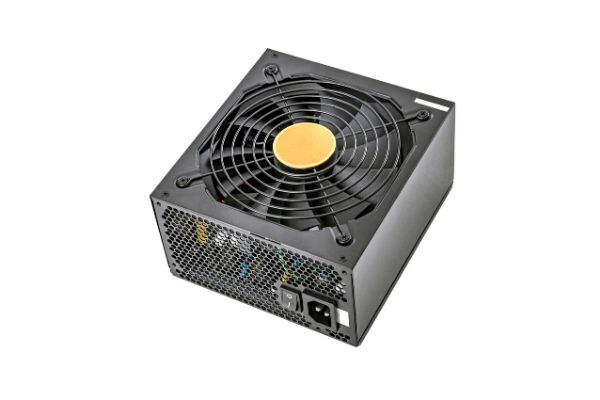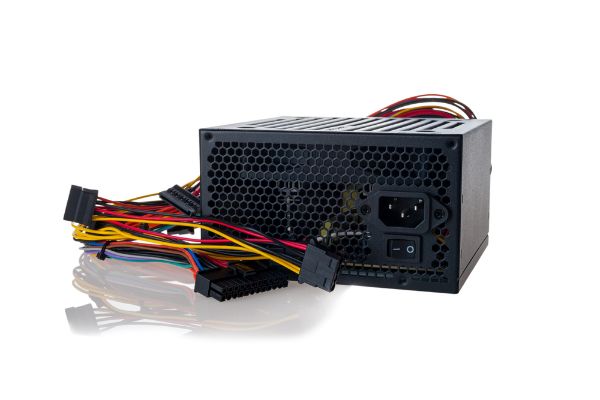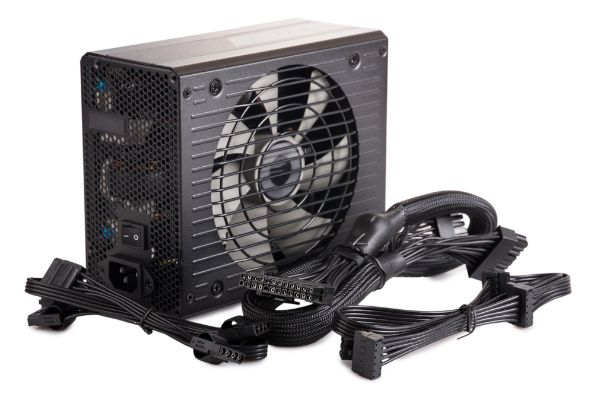Disclaimer: This post may contain affiliate links, meaning we get a small commission if you make a purchase through our links, at no cost to you. For more information, please visit our Disclaimer Page.
The power supply unit, often something that people will abbreviate as just a ’PSU’, is an important component of almost all technology that we use today. In fact, a good PSU is something you’ll find in appliances that are on a much lower scale than the powerful desktops or efficient laptops that you might use at home or in the office. That said, PSUs are something people will most commonly associate with computers.
They are pieces of hardware inside the computer itself, and they are responsible for helping the rest of the components get the power they need in order to function. Power supply units take mains AC power, bring it into the computer, and convert that energy into a DC current that the machine distributes to the rest of its hardware.
These PSUs are essential for standard operations that a computer might perform, but they also deliver low voltages that allow the machines to remain in a standby mode and keep their peripherals active, too.
Because they are so important, many computer users wonder if power supply units only draw whatever energy levels they need, or if they want to draw the maximum amounts they can handle on a consistent basis. In our article today, we will address both of these related topics.
As we do so, we will also cover more in-depth questions about exceeding the maximum allowable wattage, using a PSU that has a much higher rating than necessary for a particular device, and talk about whether a power supply unit can have too much wattage. As a way to answer these questions, we will also discuss buying a PSU that has a greater wattage, and we can give you some tips on choosing the right model for your needs.
Table of Contents
Does PSU Always Draw Maximum Power?
Unless there is some kind of fault inside the PSU, no, it does not always draw the maximum power level.
A manufacturer will rate a PSU at being able to handle an upper limit in terms of the wattage it can deliver. However, for the most part, the developers make it so that the power supply unit will draw whatever energy it needs.
This means that the unit will provide enough power for the computer in question to perform its tasks at the level you need. This explanation somewhat simplifies the rather complex nature of PSUs, but it is important to understand that they are not operating at their peak capacities all the time.
The main job of a power supply unit is to convert the higher voltages that you get from mains power into lower ones that the delicate circuitry of a computer can handle.
There are times when your computer may need slightly more power than it usually does. In such circumstances, the PSU can increase the power it delivers to the system. However, developers tend not to make power supply units that operate at this high level for long periods. If the PSU did that, it would run the risk of damaging the hardware inside your computer.
Therefore, as important as it is to give the desktop or laptop enough energy to run properly, it is equally important to make sure that these kinds of devices do not receive so much energy that they take damage. The way power supply units can adjust for this is part of what makes them such valuable additions to any computer.
What Happens if You Exceed the Wattage for a PSU?
As we touched on earlier, each power supply unit that is available will have a specific maximum rating. While most devices that use these PSUs should stay within that range, there are rare occasions in which they might exceed the maximums that the power supply can provide. When something like this happens, the power that the unit can deliver will drop quite suddenly.
A couple of things can happen when something like this occurs. In some instances, the PSU might be capable of delivering enough energy for some of the basic system functions to keep going without any loss of data. Other parts of the system may shut themselves off, however.
Otherwise, the unit that is using the power supply is no longer getting the energy that it needs. This means that it may have no choice but to shut down completely due to a lack of power.
If the power supply manages to detect the overload, it may hold itself in an off position until it can detect that the load is at safe levels once more. If the PSU fails to make this distinction, it is possible that it will continue to try to turn itself on, but it will still not have the wattage necessary to maintain safe function. Should this be the case, your machine might be at risk of having a power supply that continuously tries to turn on, goes into a brownout state, and repeats the cycle until it dies.
The above scenario is why it is important to make sure that the PSU can always handle the upper limit of the power needs a given machine might have. For the average computer that a consumer might purchase, this is usually not a problem. Most of these devices have relatively low power needs, particularly when you contrast them with the upper limits that their own PSUs can put out.
Some power supplies may be able to draw a lower voltage, and this current can allow the system to keep functioning while you recover crucial data. Others may not have this function, and you could lose data or face damage to parts of the system as a result of exceeding the wattage markers.
Is It OK if a PSU Is Too Powerful?
Many people in the tech world might recommend that you make sure a power supply unit that can go over what you think the maximum power needs for a device are.
There is no hard rule for how much more the PSU should be able to go over, but you may wish to check out whether the one you have in mind can deliver 10 or 20 percentage points of power above whatever the maximum is for your unit. Having a rating like this will give the power supply some breathing room.
Additionally, making sure that your PSU can go above the maximums for your system could help you avoid some of the problems we talked about in the last section.
With more room to deliver more power, you can mitigate the risk of the system’s wattage exceeding what the PSU can deliver. If you’re interested, we have an article about what happens when your PSU is too weak.
This kind of thing can make sure that you don’t lose any data, and it can help you protect the sensitive components inside your system.
Can PSU Have Too Much Wattage?
Typically, it is very difficult for a power supply unit to have too much wattage for a given system. Some exceptions may exist, and we stress that we are referring to good power supplies of decent quality from reputable brands.
There are many brands of PSUs out there on the secondary market. It is possible that you could find one that doesn’t meet the quality standards that most major production companies would have in place.
If this is the case, you might increase your chances of ending up with a power supply unit that could deliver too much power to a system, potentially overloading it. This kind of thing is rare, but we mention it here as a precaution.
The way developers manufacture power supply units makes it hard for them to deliver too much current, though. For example, if you have a PSU that is supposed to be able to deliver 600 watts of power at its maximum level, you might stick it inside a system that says it only needs 300 watts.
When you do this, you might be concerned about overloading the system or frying some components. In most cases like this, the worst thing you will do is spend more money than you need to in order to get the best results. Unless there is a critical fault somewhere in the design of the power supply unit, it should not overload your system.
In fact, it should run cooler than other units, extending its life by making sure it doesn’t have to work as hard as it might on a lower wattage.
Should You Buy a Higher Wattage PSU?
There is nothing wrong with buying a power supply that has a rating that matches the needs of your system. However, there might be a few reasons to look into PSUs that can give that system more than it needs. Here are just a few examples that can help you in your search:
1. Having a PSU with a higher wattage can make it easier for you to upgrade parts without also replacing the power supply in the future. This can give you more freedom to add different specs to your system.
2. A power supply unit with a rating that is a bit higher than is necessary for your computer might add some noticeable benefits to overclocking. Parts that you overclock need more energy, and a PSU with a higher wattage should be able to provide that energy.
3. Running a higher PSU than you need to might increase the electricity use and energy efficiency of your device. This can depend on how you set things up, but it is possible that you could see your overall energy use improve with the right PSU.
How Do I Choose the Right PSU?
There is no single correct way to choose a PSU for your needs, but here are some things you may wish to consider:
1. The size and form factor of the unit should be able to work within the confines of the system you have.
2. Some power supply units are modular, and others are not. This feature may impact which cable preferences you have.
3. Decide on the additional features you might like. These can include special lighting for RGB components, testing buttons to keep track of the current, and more.
4. Before you buy, consider how efficient you want your supply to be, and take a look at what kind of protection it offers if problems do occur.
Conclusion
Power supply units provide critical energy to your system, and getting one that has a higher rating than you might need can help you when it comes time to upgrade your system. Fortunately, most PSUs that have quality builds cannot deliver too much energy to your computer, and they tend to shut off as a safety feature if the system demands too much.
You can use some of our tips to choose the PSU that matches your needs, and we recommend that you stick with decent, reputable brands for the best results.



